FEMINIST COALITION FACES DOWN THE CARTER CAMPAIGN
by Jo Freeman
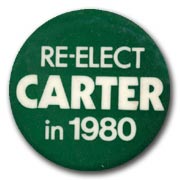 Published in In These Times, Vol. 4, No. 33, Aug. 27, 1980, p. 2.
Published in In These Times, Vol. 4, No. 33, Aug. 27, 1980, p. 2.See 1980 Democratic Convention photos.
"Women came of age politically." summed up Sally Lunt of Massachusetts, a longtime activist in both the women's movement and the Democratic Party. "We forced support of platform language to implement the Equal Rights Amendment despite an administration mentality that does not recognize that women have political power."
The language was minority report number 10, which added to an already strong ERA plank the promise that "the Democratic Party shall offer no financial support and technical campaign assistance to candidates who do not support the ERA." It, and minority report number 11, which added support of government funding for abortions for poor women to the support for the 1973 Supreme Court decision already in the platform, became the focus of feminist activities at the 1980 Democratic convention.
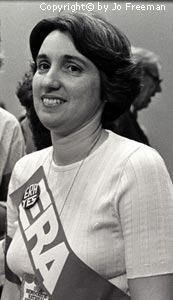
Ellie Smeal
|
Feminists were organized into the Coalition for Women's Rights by Iris Mitgang, president of the National Women's Political Caucus (NWPC) and Ellie Smeal, president of the National Organization for Women (NOW). While the Coalition was primarily a leadership group consisting of the heads of the major feminist organizations, elected officials, funding sources and media stars, the troops came primarily from the approximately 20 percent of the delegates who were NWPC or NOW members, and the staffing was supplied by the NWPC.
During the last year the NWPC held 22 workshops in 18 states to prepare its members to win delegate spots at the Democratic Convention in response to a 1978 rule change requiring that half of all delegates be women. The NWPC has also held meetings with other women's groups all year in preparation for the convention, but it wasn't until June that it and NOW began, for the first time in their history, a close working relationship.
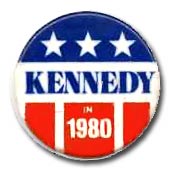 This relationship included support of the "open convention" proposal pushed by the Kennedy forces. Although the NWPC had Carter supporters among its delegates, NOW officially opposed Carter's renomination and many other members of the Coalition, in particular Bella Abzug, urged that feminists would have no bargaining room unless the rule requiring delegates to vote on the first ballot for the candidate they were committed to during the primaries were repealed.
This relationship included support of the "open convention" proposal pushed by the Kennedy forces. Although the NWPC had Carter supporters among its delegates, NOW officially opposed Carter's renomination and many other members of the Coalition, in particular Bella Abzug, urged that feminists would have no bargaining room unless the rule requiring delegates to vote on the first ballot for the candidate they were committed to during the primaries were repealed.
Ironically, Coalition support of the open convention movement created the impression among the Carter operatives that the Coalition was more anti-Carter than pro-#10 and #11. Thus the Carter people did not even try to meet with Coalition leaders until the day before the platform was to be discussed at the convention. Then the Carter campaign sought compromising language only on #10, which they felt was not pro ERA, but a single-issue "loyalty test" inappropriate for a pluralistic party. A two-page typewritten sheet circulated to Carter whips who were lobbying delegates against #10 made an analogy between such a demand and the tactics of the "New Right, who demand that public figures toe the line on their particular issue." It said that withholding financial support from Democrats who did not support the ERA was a form of "blackmail" that would not change their position but would "make them less able to compete effectively in the general election.
The Coalition argued that Carter opposition on #10 would be perceived in the press only as a repudiation of the ERA and held firm despite their knowledge that Carter delegates dominated the convention and their fear that Carter whips would convince their delegates that #10 was a test of loyalty to Carter, not the ERA.
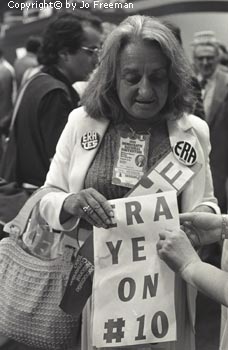 Betty Friedan |
|---|
The Carter campaign then persuaded Judith Lonquist, who had drafted #10 as a member of the Platform Committee, to withdraw it. Lonquist was a former Vice President of NOW who had been on the losing side of the power struggle in NOW that brought Ellie Smeal to prominence five years ago. However, she had filed the minority report under the imprint of a Platform Committee "caucus," and the Coalition pointed out that any withdrawal would require the agreement of all who had originally signed.
According to Iris Mitgang, this Carter tactic unified Coalition groups against any compromise. "Carter used such a heavy hand that they became the enemy," she said. The Coalition was already displeased at the administration efforts to play off one group against another and now felt that despite the odds against them the time had come to stand pat.
ERA wins.
Nontheless, four Carter supporters, including White House aide Sarah Weddington and former Assistant Secretary of Housing and Urban Development Donna Shalala met with NOW and NWPC members from 2:30 to 4:00 a.m. Tuesday to try again. They told the Coalition that the Carter campaign would "whip down" on #10, and that if the Coalition didn't compromise, they would cause the perception of an ERA defeat that they so wanted to avoid. Instead, Donna Shalala offered to write a "stronger, more positive" statement of support.
To this, Sally Lunt, a candidate for state representative in Massachusetts, replied. "My idea of an acceptable stronger statement is that the president will withhold all federal money from all states which have not ratified until they do so." The Carter representatives neither accepted this nor offered specific alternative language, and it became increasingly clear to the coalition that the Carter campaign had sent them negotiators who had no decision-making power.
The vote on minority report #10 had been scheduled for early Tuesday afternoon, but was postponed for several hours as each side "whipped" their delegates. The issue was finally settled two hours before the vote when the National Education Association (NEA), which had the largest single bloc of pro- Carter delegates, announced it would support #10.
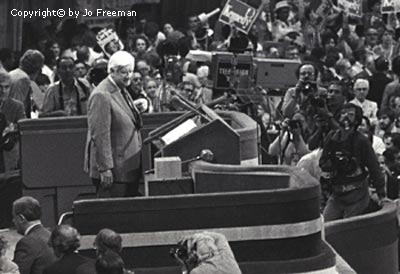 Tip O'Neill |
Hamilton Jordan called off the Carter whips, and convention chair Tip O'Neill phoned Bella Abzug to suggest that both sides agree on a voice vote to save both the time and the potential embarrassment of a roll call.
Abortion rights passed.
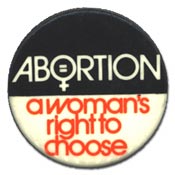 After #10 passed by acclamation, #11, on which neither side had whipped, passed by two-to-one, and feminist groups celebrated their victory. This minority report, written by platform member Gloria Steinem, had not been polarized as was #10 partially because it did not commit party resources and partially because it was not perceived by the Carter campaign as primarily a Kennedy proposal. The signatories on the minority report had included a significant number of Carter supporters.
After #10 passed by acclamation, #11, on which neither side had whipped, passed by two-to-one, and feminist groups celebrated their victory. This minority report, written by platform member Gloria Steinem, had not been polarized as was #10 partially because it did not commit party resources and partially because it was not perceived by the Carter campaign as primarily a Kennedy proposal. The signatories on the minority report had included a significant number of Carter supporters.
At a Sunday press conference, presidential aide Stuart Eizenstadt had announced that Carter opposed #11, but it wasn't a priority concern. When some Carter whips nonetheless interpreted this as a sign that they should lobby against #11 the National Abortion Rights Action League (NARAL) appealed to the Carter campaign to clarify the president's position. The campaign obligingly told their whips that the president might be opposed, but the delegates should vote their own consciences.
NARAL executive director Karen Mulhauser described this victory as a tribute to the "political power of pro-choice organizers." Like the NWPC, NARAL had begun months earlier to poll and lobby delegates on pro-choice positions. Mulhauser said approximately 300 delegates were NARAL members and NARAL had a whip system in place separate from that of the Coalition for Women's Rights should it be necessary. Although she sympathized with the Coalition, Mulhauser said NARAL had not actively participated in it because as a single-issue organization it couldn't work on the other two issues around which the Coalition was formed. In particular, it could not support the open convention proposal, since half of NARAL's whips were Carter delegates.
Fortunately, minority report #11 was never as doubtful as #10. Not only was it not being "whipped" by the Carter campaign, but it had the smallest margin of defeat in the Platform Committee. Since polls showed about 73 percent of the delegates supported it and its passage required no commitment of tangible resources, only a mistake by supporters or a strong anti-feminist reaction by delegates would have doomed it. Thus at the Democratic convention, as at the Republican convention, abortion took back seat for controversy to the ERA.
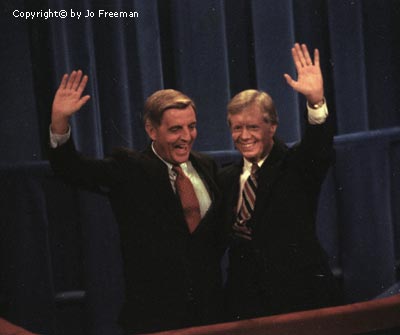
Books by Jo | What's New | About Jo | Photos | Political Buttons
Home | Search | Links | Contact Jo | Articles by Jo